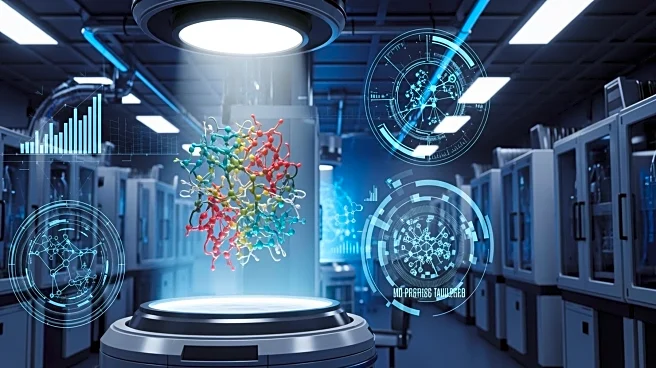What's Happening?
Caravel Bio has been awarded a $7.8 million grant from the U.S. National Science Foundation Directorate for Technology, Innovation and Partnerships. This funding is aimed at developing a unified platform
for protein discovery and delivery, which integrates cell-free protein synthesis with bacterial spore display. The platform is designed to overcome longstanding limitations in protein design by enabling rapid, scalable cell-free directed evolution. Caravel's approach allows for the parallel testing of millions of protein variants, which can be efficiently delivered as enzymes or vaccines. The grant supports collaborations with institutions such as Avery Bio, Caltech, Rutgers University, and Oregon State University, focusing on advancements in DNA synthesis, animal health, and sustainable chemical manufacturing.
Why It's Important?
The NSF grant positions Caravel Bio to significantly impact various industries by enhancing protein engineering capabilities. The ability to synthesize proteins with novel chemistries could lead to breakthroughs in cancer therapy, microbial engineering, and biomaterials production. In animal health, the development of thermostable protein-based vaccines could improve livestock disease management. Additionally, the engineering of enzymes for clean chemical production supports sustainable manufacturing practices, potentially reducing pollution and energy consumption. This initiative not only advances scientific research but also promises economic benefits by fostering innovation in domestic manufacturing and biotechnology sectors.
What's Next?
Caravel Bio plans to lead a three-year initiative with its partners to further develop and implement its protein engineering platform. The collaboration includes conducting technoeconomic analyses and exploring practical applications in various fields. The company aims to expand its research and development efforts, supported by strategic advisors and additional funding from venture capital and NSF awards. As Caravel continues to refine its technology, stakeholders in biotechnology, healthcare, and manufacturing industries are likely to monitor its progress closely, anticipating potential commercial applications and industry-wide impacts.
Beyond the Headlines
Caravel Bio's approach to protein engineering could redefine the role of biology in industrial applications, promoting a shift towards more sustainable and efficient production processes. The integration of machine learning models with high-throughput synthesis methods may accelerate the discovery of new protein functions, offering long-term benefits in scientific research and industrial innovation. Ethical considerations regarding the use of engineered proteins in various applications may arise, necessitating discussions on regulatory frameworks and public acceptance.









